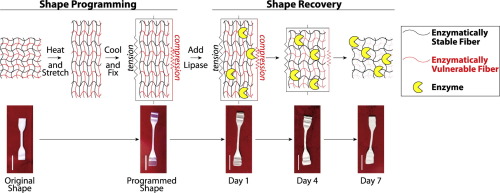Shape memory polymers (SMP) have major implications for healthcare, and Syracuse University engineers have created a new kind of SMP that could be useful for healing.
SMPs are soft, rubbery, “smart” materials that can change shape in response to external stimuli like temperature changes or exposure to light. They can hold each shape indefinitely and turn back when triggered to do so.
Existing SMPs could be used as cardiovascular stents because they can be one shape for surgical insertion and another once positioned in a blood vessel. The warmth of the patient’s body can trigger the change.

Syracuse University College of Engineering and Computer Science engineers, along with collaborators at Bucknell University, have now designed an SMP that can change its shape in response to exposure to enzymes and is compatible with living cells. It requires no additional trigger, such as a change in temperature. Given these properties, it can respond to cellular activity like healing.
“The enzymatic sensitivity of the material allows it to respond directly to cell behavior,” explains biomedical engineering Ph.D. candidate Shelby L. Buffington. “For instance, you could place it over a wound, and as the tissue remodeled and degraded it, the SMP would slowly pull the wound closed. It could be adapted to play a role in treating infections and cancer by adjusting the material’s chemistry.”
The team created the material using a process called dual electrospinning, in which a high-voltage current is applied to two needle tips pumping two separate polymer solutions. The voltage draws out the polymer fibers, and they are blended into a fiber polymer mat. The proper combination of fibers gives the material its shape memory qualities.
Story via Syracuse University
